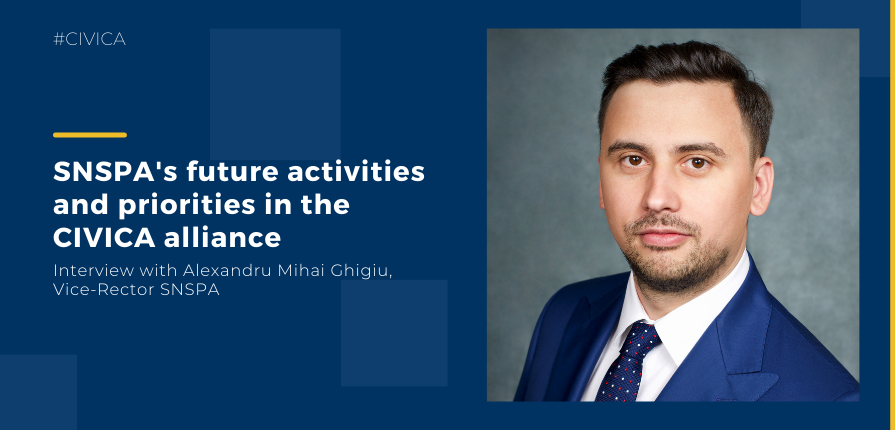Alexandru Mihai Ghigiu sees SNSPA’s CIVICA membership as an investment in the university’s future and its students, and envisions influencing our continent.
Alexandru Mihai Ghigiu, PhD, is currently Vice-Rector of the National University of Political Studies and Public Administration (SNSPA) in Bucharest, Romania. Previously he served as Senior Advisor to the Romanian Minister of National Education and Deputy Minister in the General Secretariat of the Romanian Government. Ghigiu holds a PhD in Political Science and teaches different courses related to EU policies, focusing on EU foreign policy. We recently talked to Ghigiu about his involvement in CIVICA and SNSPA’s role in the alliance.
How long have you been involved in the CIVICA alliance?
I have been part of this wonderful initiative since its beginning. So far, it has been a great experience to work with colleagues on ‘growing’ CIVICA projects.
Since October 2019, I have been representing my university in CIVICA’s Steering Committee. This body is the powerhouse for steering our joint enterprise. The Steering Committee takes or prepares decisions on most ongoing matters within our European University.
Our meetings inspire us all; we typically exchange ideas, share initiatives, and identify solutions for implementing CIVICA activities within our institutions. As I like to say, we developed a “CIVICA family spirit.” For example, in the original project application, we mentioned that the Steering Committee should convene at least twice a year, but we found our exchanges so beneficial that we decided to meet monthly.
Since 2019 our main aim has been to turn CIVICA into a foremost priority for each member institution and a central actor in European education, research, and innovation. We also wanted our alliance to carry into the world the values of Europe and the social sciences.
What does the CIVICA membership mean for SNSPA?
CIVICA represents to our academic community more than a European project. It represents an investment in the future of our institution, our students. I would even dare to say that this initiative will influence our continent.
SNSPA shares the educational philosophy of CIVICA and values the core mission of the alliance. It thus stands united with the other partners in the attempt to co-create a more sustainable educational process for the social sciences in Europe, while embracing diversity in institutional, political, social and economic contexts.
Our shared aim is to equip students with the education and fundamental skills required in the European labour market. We also aim to provide students with the competencies needed for advanced research in the social sciences, and instill in them the core values and principles of democratic societies and citizenship. These goals are reflected in curriculum design, teaching and researching methods, and the university’s governance.
Tell us about a recent CIVICA activity where SNSPA played an important role.
On 1 July, SNSPA had the honour to host virtually a meeting of the CIVICA Presidents’ Committee, the top governance body that is supervising the strategy and development of our European University. The meeting was an excellent opportunity to present CIVICA’s achievements and brainstorm on the long-term development of our partnership.
What are SNSPA’s top priorities within CIVICA?
I want to briefly mention a couple: an entirely online joint degree, an initiative to conduct everyday research on Covid-19, the engagement of external stakeholders, and the general strategy for our cooperation in the short and medium term.
What are some key CIVICA benefits from the SNSPA perspective?
For SNSPA, this initiative continues to be an excellent opportunity to exchange good practices, improve educational and research activities, and be part of an academic family that shares the same values. We believe that universities have the leading role in educating future generations and generating solutions to the world’s most pressing challenges, and CIVICA is a great platform to turn this ambition into reality.
Interview by Catalin Mosoia (SNSPA)
*This interview was originally published on the website of CIVICA – The European University of Social Sciences



